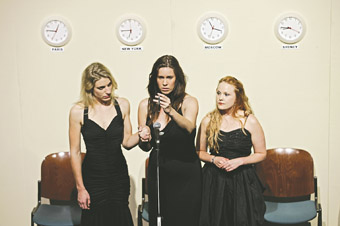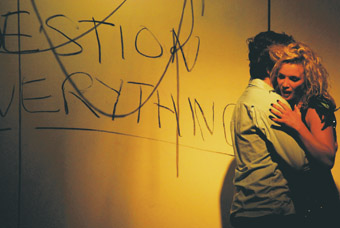canonical miss-takes
john bailey: 3xsisters, a dream play, kafka’s monkey

Shelly Lauman, Katherine Tonkin, Anne-Louise Sarks, 3XSisters, Hayloft Project
photo Jeff Busby
Shelly Lauman, Katherine Tonkin, Anne-Louise Sarks, 3XSisters, Hayloft Project
THE APPARENT DEMISE OF THE CLASSIC PLAY IS A BIT OF A STALE POINT THESE DAYS. THOUGH THERE ARE STILL INTERMITTENT RUMBLINGS ABOUT THE INCREASING DOMINANCE OF NON-TEXT-BASED THEATRE, A QUICK LOOK AROUND WILL PUT THE ARGUMENT TO BED. EVEN MALTHOUSE THEATRE’S MICHAEL KANTOR—ONE OF THE MOST VOCAL PROPONENTS OF COLLABORATIVE, IRREVERENT THEATREMAKING—REGULARLY TURNS TO THE OLD GREATS FOR MATERIAL. THE INDIE SECTOR, TOO, IS POPULATED BY CANONICAL TITLES. A BRIEF SURVEY OF SOME RECENT ADAPTATIONS DOESN’T EXACTLY ARGUE WELL FOR THIS FAITH IN THEIR ENDURING VALUE, HOWEVER.
The Hayloft Project’s ambitious take on Chekhov’s Three Sisters—here renamed 3xSisters—is the first case in point. Three directors took randomly selected chunks of the original and independently produced their own bold reimaginings employing the same cast. Simon Stone took a fairly modernist, faithful approach. Relocating the opening and closing parts of the play to a brightly lit waiting room, he confidently played around with the setting and structure of the work while remaining true to its dramatic core. This is consistent with Stone’s past Hayloft efforts such as Spring Awakening and Platonov, both excellent productions that successfully reshaped classic texts to revitalise their essence without bastardising their original spirit.
Benedict Hardie’s sequences employed meta-theatrical devices to denaturalise Stone’s preceding scenes. Suddenly we were watching a group of actors rehearse and discuss the play, with occasional directorial interruption and character swapping. Though more formally innovative, it was never clear what this distancing was supposed to achieve, and Chekhov’s narrative certainly disappeared in the controlled chaos of rehearsed spontaneity. I suppose it’s a nice irony that the script faded away once it was being held in hand onstage by the performers.
Mark Winter’s central section of the play was the most confounding, seemingly dispensing with the text almost entirely and injecting an array of intertexts which seemed almost randomly selected. Mild jabs at the Australian performance landscape—an emergency theatre kit posted by Benedict Andrews, for instance—collided with entire slabs of dialogue lifted from Scorsese’s Taxi Driver; bloody violence was dispensed with casual abandon; characters lost any sense of verisimilitude as they became mere velocities, effects without cause. It’s the kind of anti-theatre that Black Lung, of whom Winter is a member, do so well. Here, not so much.
The question which underscores 3xSisters is—why? Why adapt Chekhov at all? The play itself seemed of little interest to the directors, acting rather as a hook upon which to hang a series of formal or stylistic costume changes. This might be a worthy artistic choice if any of these forms were advanced in productive new ways, but as theatre, meta-theatre or anti-theatre, 3xSisters never quite goes beyond the level of experiment.
I’m all for irreverence, though. Caryl Churchill’s 2005 translation and adaptation of Strindberg’s A Dream Play radically reworked the original, paring back its bloated mass to produce a tighter, more aerodynamic thing. This is commendable, since Strindberg’s play is of much historical interest but pretty dusty looking these days. The 1901 text may have been a pioneering work of non-rational, non-naturalistic theatre, but it’s naïve to try to recreate that avant-garde experience in an age where surrealism can be found in a Cadbury’s chocolate commercial.

Michael Finney, Meredith Penman, A Dream Play, IGNITE
photo Chris Nash
Michael Finney, Meredith Penman, A Dream Play, IGNITE
Ignite Theatre’s production of A Dream Play managed to enable a rewarding experience despite the limitations of its source. This was mostly due to Churchill’s text and strong, energetic performances from a group of young-ish but well-experienced actors. Meredith Penman delivered a dynamic, visceral protagonist who held together the disparate, illogical scenes which make up the play; her fellow cast-members each took on a variety of roles and managed to make each distinct and, mostly, attention-grabbing. The only hobbled point of the work is the lengthy sequences involving the tortured Writer, a partial stand-in for Strindberg himself. Nobody needs to see the old cliché of an angst-riddled writer wrestling with the meaning of the universe; let the work itself do that job. Ignite and director Olivia Allen do the best they can with this little hiccup, though, and at least the rattling pace of the production doesn’t allow it to dwell too long on such sludgy moments.
If there’s one writer who epitomises that tortured cliché, it’s good ol’ Kafka. A figure whose biography is as fascinating as his writings, Kafka is as good as his reputation suggests. Many of his stories feature the image of the message which can never reach its recipient or the seeker forever delayed from reaching his destination; apt metaphors for the meanings of his elusive works themselves, which constantly retreat from our interpretive grasp without ever fully escaping our hopeful advances. If you can’t tell, I really like Kafka. I also really like monkeys, but the recent Malthouse Theatre presentation of UK performer Kathryn Hunter’s acclaimed turn as Kafka’s Monkey, touring nationally, disappointed on both fronts.
The piece is a solo adaptation of Kafka’s short story “A Report to an Academy.” A monkey is shot by hunters on the coast of Africa and transported to civilised Europe, learning along the way to ape the actions and speech of his masters in order to survive. He eventually chooses a life on the variety stage—the zoo being his only other option—and suppresses all traces of his earlier existence. It’s a tiny work but there’s a lot going on beyond this quick synopsis. The story raises thorny questions of the naturalness of identity, the fluidity of performance and countless connotations of otherness and the violence of acculturation. All of these are present to a degree in Hunter’s performance, but what is lacking is a real sense of the monstrous role of language underscoring Kafka’s story.
In A Report to an Academy, language embeds itself as a kind of cage, imprisoning the narrator. The ironic, coolly rendered prose is itself a problem, making evident the forced abstention of any actual “monkeyness” from its speaker. He is an exile from himself, a refugee who has built a raft of words. And, being a short story, words are all we have of his slippery existence.
The problem in performing such a text should be obvious—physically embodying a character who is more of an absent haunting than an authentic-seeming presence. And Hunter, under the direction of Walter Meierjohann, is a compelling physical performer. But her success is in imitating, even caricaturing, the loping, wide-eyed demeanour of a monkey. Her monkey is all presence, often stepping down into the audience to touch her spectators, or offer a banana, pick at fleas in their hair—solid theatre tricks that seem entirely misplaced here. Though she is clad in the stiff attire of a tuxedo and speaks of her assimilation into human society, this is an incarnation that seems intent on showing us a primate, rather than mourning its disappearance.
Kafka’s Monkey is a very watchable theatre, enjoyable even, but it’s not Kafka. And while 3xSisters barely attempts to be Chekhov, and A Dream Play displays an admirable distance from Strindberg, the more polished, expertly executed Kafka’s Monkey finally seems the least comprehending of its source.
The Hayloft Project, 3xSisters, after Three Sisters by Anton Chekhov, directors Simon Stone, Benedict Hardie, Mark Winter, design Claude Marcos, lighting Danny Pettingill, performers Gareth Davies, Angus Grant, Thomas Henning, Joshua Hewitt, Shelly Lauman, Eryn Jean Norvill, Anne-Louise Sarks, Katherine Tonkin, Tom Wren; Arts House Meat Market, April 24-May 10; Ignite Theatre, A Dream Play, after A Dream Play by August Strindberg, adapted by Caryl Churchill, director Olivia Allen, sound design Russel Goldsmith, lighting Angela Cole, set & costumes Kat Chan, Eugyeene Teh, performers Gary Abrahams, Meredith Penman, Mark Tregonning, Michael Finney, Heath Miller, Kate Gregory, Nicholas Dubberley, Hannah Norris, Karen Roberts; Bella Union, Trades Hall, May 5-17; Young Vic, Kafka’s Monkey, after “A Report to An Academy” by Franz Kafka, director Walter Meierjohann, adapted by Colin Teevan, performer Kathryn Hunter, set Steffi Wurster, costume Richard Hudson, lighting Mike Gunning, sound & music Nikola Kodjabashia; Malthouse, Melbourne, April 28-May 9
RealTime issue #91 June-July 2009 pg. 40






